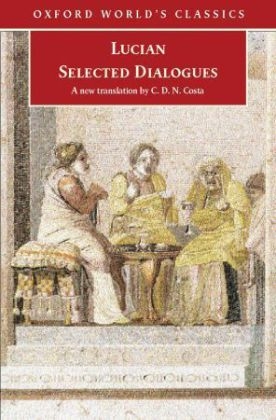
Selected Dialogues
Seiten
2006
Oxford University Press (Verlag)
978-0-19-280593-5 (ISBN)
Oxford University Press (Verlag)
978-0-19-280593-5 (ISBN)
- Titel ist leider vergriffen;
keine Neuauflage - Artikel merken
The Greek satirist Lucian was a brilliantly entertaining writer who invented the comic dialogue as a vehicle for satiric comment. This lively new translation is both accurate and idiomatic, and the introduction highlights Lucian's importance in his own and later times.
'you'll find another man to harvest, Glycerion: let this one go' The Greek satirist Lucian was a brilliantly entertaining writer who invented the comic dialogue as a vehicle for satiric comment. His influence was immense, not only in the Greek world, but on later European writers such as Rabelais and Swift. His dialogues puncture the pretensions of pompous philosophers and describe the daily lives of Greek courtesans; they are peopled by politicians, historians and ordinary citizens, as well as by gods and mythic figures. This selection provides a cross-section of Lucian's styles and satirical targets, from serious polemic to lighter squibs and character portrayals. It includes How to Write History and his most famous piece, A True History, a fabulous tale of space travel and a monstrous whale which prefigures the fantasies of Jules Verne. This lively new translation is both accurate and idiomatic, and the introduction highlights Lucian's importance in his own and later times.
'you'll find another man to harvest, Glycerion: let this one go' The Greek satirist Lucian was a brilliantly entertaining writer who invented the comic dialogue as a vehicle for satiric comment. His influence was immense, not only in the Greek world, but on later European writers such as Rabelais and Swift. His dialogues puncture the pretensions of pompous philosophers and describe the daily lives of Greek courtesans; they are peopled by politicians, historians and ordinary citizens, as well as by gods and mythic figures. This selection provides a cross-section of Lucian's styles and satirical targets, from serious polemic to lighter squibs and character portrayals. It includes How to Write History and his most famous piece, A True History, a fabulous tale of space travel and a monstrous whale which prefigures the fantasies of Jules Verne. This lively new translation is both accurate and idiomatic, and the introduction highlights Lucian's importance in his own and later times.
C. D. N. Costa is Emeritus Professor of Classics, University of Birmingham.
Praise of the Fly ; The Dream ; Charon ; Timon ; Icaromenippus, or High Above the Clouds ; Nigrinus ; The Death of Peregrinus ; Hermotimus or On Philosophical Schools ; Alexander ; Demonax ; Lovers of Lies, or The Sceptic ; How to Write History ; A True History I ; A True History II ; Dialogues of the Courtesans
| Erscheint lt. Verlag | 8.6.2006 |
|---|---|
| Reihe/Serie | Oxford World's Classics |
| Übersetzer | C. D. N. Costa |
| Verlagsort | Oxford |
| Sprache | englisch |
| Maße | 130 x 200 mm |
| Gewicht | 221 g |
| Themenwelt | Literatur ► Essays / Feuilleton |
| Literatur ► Zweisprachige Ausgaben ► Deutsch / Englisch | |
| Geisteswissenschaften ► Sprach- / Literaturwissenschaft ► Anglistik / Amerikanistik | |
| Geisteswissenschaften ► Sprach- / Literaturwissenschaft ► Literaturwissenschaft | |
| ISBN-10 | 0-19-280593-2 / 0192805932 |
| ISBN-13 | 978-0-19-280593-5 / 9780192805935 |
| Zustand | Neuware |
| Haben Sie eine Frage zum Produkt? |
Mehr entdecken
aus dem Bereich
aus dem Bereich
Zweisprachige Ausgabe (deutsch/englisch) / Parallel gesetzter Text …
Buch | Softcover (2024)
Anaconda Verlag
CHF 9,75
Buch | Softcover (2024)
dtv Verlagsgesellschaft
CHF 18,20


